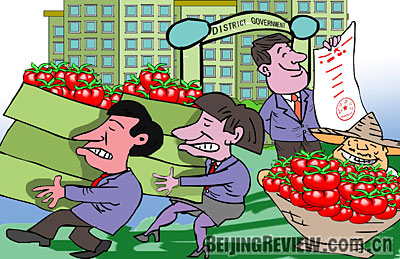|

In the face of a struggling tomato market, the government of Guiyang City's Baiyun District, in southwest China's Guizhou Province, issued a circular demanding all local government staff buy tomatoes. It wasn't long before local residents were being very vocal about the move.
Earlier this year, local farmers in Baiyun District planted 1,333 hectares of tomatoes, yielding almost 60,000 tons of the crop. However, due to the limited market demand, tomatoes were not selling well and farmers were hit hard financially. Realizing the problem, the Guiyang Municipal Government issued an instruction to county and district governments under its jurisdiction, urging them to take effective measures to promote tomato sales.
In response to the municipal government's demand, Baiyun District launched a "tomato tasting initiative" - requiring all members, officials and ordinary staff in local government departments, public organizations and businesses attached to the government to each "taste" 50 kg of tomatoes. In other words every one of them was being told to buy 50 kg of tomatoes.
The bottom line was that tomato farmers were able to sell their crops and prevent huge financial losses. In the process, farmers lavished praise on the district government.
Nevertheless, the district government is also blamed for arbitrarily using administrative power to interfere with the economy. Recent years have seen governments at various levels moving away from directly interfering with economic operations, something that is a basic tenet of a market economy. What the local government of Baiyun District did is to act counter to this rule.
Some people suggest that what local authorities need to do most is to help farmers find markets or provide guidelines so they can adjust the planting of cash crops, instead of creating a false market in this way. If such practices become common, when the next vegetable sales crisis looms, they ask, will local government workers again be forced to stock up?
Helping the people
Zhao Dengyan (The Beijing News): It's hoped that farmers can solve the sales problem by relying on the market's self-adjustment. However, this seems like an illusion. The farmers have invested so much and worked so hard for almost a whole season, only to find no market for their crops. In this situation, although the district government has gone against market rules, if it had not taken action, who would take responsibility for the huge losses the farmers were about to suffer?
If it had done nothing in this crisis, the government would not be blamed for interfering with economic affairs, but the price to pay would have been a huge amount of tomatoes rotting in the fields.
An important function of administrative power is to serve the people, and the government must have taken into full consideration the hardship of the ordinary people in this case. If the authority pays no attention to the misery of the working class, no matter how well its action fits into regulations, then power is not being properly used. On the contrary, however, as long as policy is designed to solve the people's troubles, what seems contrary to market rules is still worth doing.
Sun Jindong (www.sdnews.com.cn): Before it issued its demand, the Baiyun District Government did a lot to explore other markets and helped farmers sell 27,000 tons of tomatoes. It has therefore made an effort to help promote tomato sales. If the government refused to help tomato farmers find new markets, what would the media say? Inevitably the district government would have been criticized for inaction.
| 